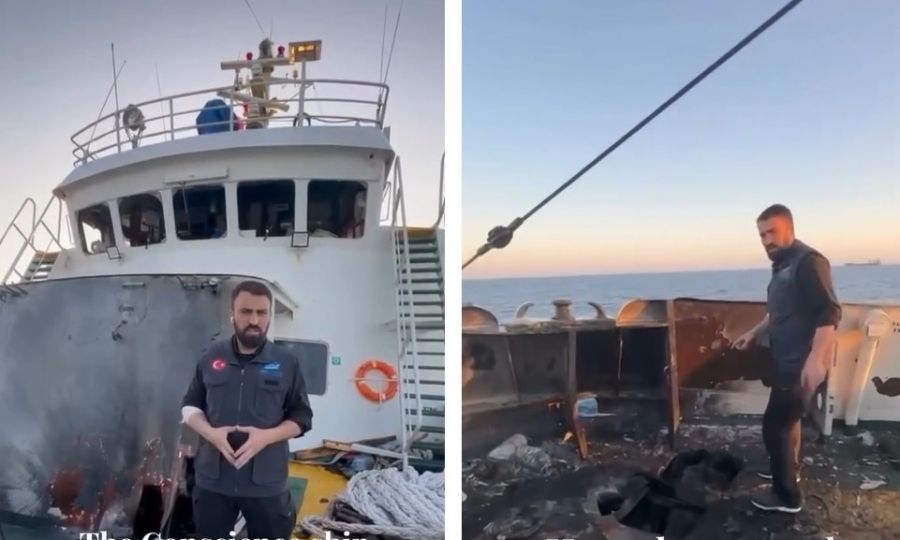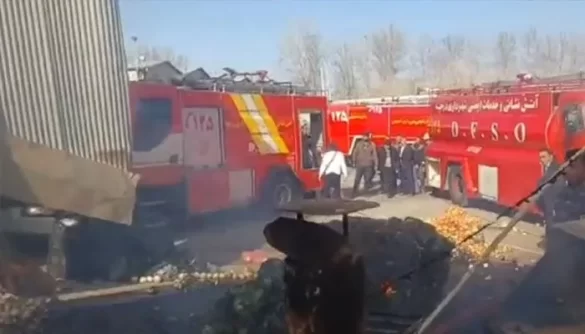Attack on Humanitarian Vessel
An aid ship carrying supplies for Palestinians in Gaza was hit by a suspected drone strike off the North African coast, sparking a fire on board and temporarily halting its mission. The vessel, sailing under the Portuguese flag, was part of the Freedom Flotilla — an international coalition seeking to deliver humanitarian aid to Gaza by sea.
According to the coalition, the strike directly targeted one of its main ships, which was carrying members of the steering committee. Despite the attack, all crew members and over 350 activists and volunteers on board were unharmed. Among them was Greta Thunberg, the prominent Swedish climate activist known for her global environmental campaigns.
Our Resolve Remains Unshaken
In a statement released after the incident, the Freedom Flotilla Coalition shared video footage of the damaged vessel. The group condemned the attack but stressed that it would not deter their mission. “This aggression cannot weaken our determination,” the coalition said, reaffirming its commitment to peaceful humanitarian efforts.
The flotilla had departed from Barcelona, Spain, on 31 August 2025. Organizers describe this as the largest and most organized maritime aid effort so far, aiming to break the siege on Gaza and deliver much-needed supplies to civilians facing acute shortages of food, water, and medicine.
A Recurring Pattern of Confrontations
This is not the first time aid flotillas have come under attack. In July 2025, Israeli forces intercepted and seized a ship named Hanzala, which had set sail from Italy carrying humanitarian supplies for Gaza. Similar incidents date back more than a decade. The most notorious case occurred in 2010, when Israeli commandos raided the Mavi Marmara, a Turkish vessel carrying activists and aid, leaving ten people dead and sparking international outrage.
The latest attack took place around 70 nautical miles from the coast of Gaza, according to the coalition. So far, no state or group has claimed responsibility, and the identity of the perpetrators remains unclear.
Gaza’s Humanitarian Crisis
The incident comes amid one of the gravest humanitarian crises in Gaza in recent history. The United Nations has repeatedly warned of a “catastrophic” situation, with the enclave’s 2.3 million residents facing severe shortages due to the long-standing blockade, which restricts the movement of goods and people.
Aid deliveries by land are often heavily restricted, leaving sea routes as one of the few remaining options for international relief groups. The Freedom Flotilla has positioned itself as a symbol of civil society resistance against the blockade, drawing volunteers and activists from more than 30 countries.
International Reactions and Calls for Accountability
While no government has officially commented on the latest strike, rights groups and humanitarian organizations have urged an immediate investigation, especially as recent Israeli strikes in Gaza killing 67 people underscore the grave risks faced by civilians even when seeking aid. Amnesty International described previous flotilla attacks as violations of international law, emphasizing that humanitarian missions must be protected.
Observers say the strike raises questions about maritime security and the risks faced by non-governmental actors operating in contested waters. Some analysts fear that such incidents could escalate regional tensions further, particularly if state involvement is proven.
What Lies Ahead for the Flotilla
Despite the setback, coalition members insist that their mission will continue. Repairs on the damaged vessel are reportedly underway, and the group is considering options to resume the voyage toward Gaza.
For activists like Greta Thunberg, the attack highlights not only the dangers of humanitarian work in conflict zones but also the determination of global civil society to confront blockades and restrictions through peaceful means.
As the ship prepares to set sail again, many see the flotilla’s persistence as both a practical effort to deliver aid and a symbolic challenge to policies that keep Gaza isolated. Whether the mission reaches its destination remains uncertain — but the message of defiance appears stronger than ever.















